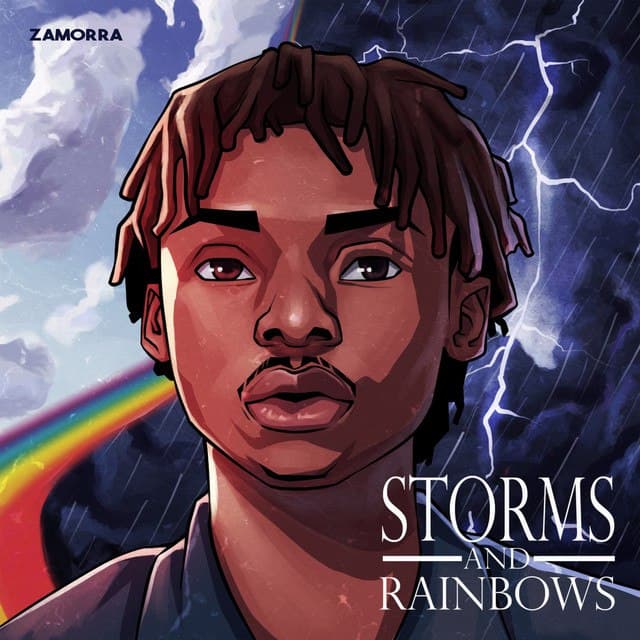Zamorra releases debut project, Storms & Rainbows
Zamorra’s debut project collects his life experiences in eight unique songs, charting the evolution of his career from Ondo to Lagos, and the in-betweens which shaped the best of his journey: family, love, pain and eventual triumph

Born Oluwashina Akinkunmi, Zamorra has been inching close to this present moment. From listening to Fuji greats in his childhood, to his undergraduate days as a student of Philosophy at the Obafemi Awolowo University, where he became friends with the likes of Fireboy DML, Blaqbonez and Cheque.
Beginning with Aiku, a warm record which features a children’s choir, Zamorra sets out to map his innermost desires. In the songs which follow, he’ll relay these desires in more detail, delivered in his trademark husky tone. “If to say man be God o, we for dun lost o/Yawa for done gas, the movie for done pause o,” he sings with a heart full of appreciation.
The bleakness of reality, with emphasis on Nigeria’s financial situation influences Balance, a record where the artist draws his conclusion with his usage of the all-too-popular phrase “life no balance.” Like My Mother finely threads romantic love to the familial, as Zamorra searches for a woman with attributes like the one who birthed him. Delivered lovingly, the mid-tempo record fits into a wedding playlist or a laidback night party. Now That You’re Mine cuts from the same heartwarming texture as the previous record, but it’s remarkably upbeat, bouncing with percussions that would soundtrack great memories filled with laughter and dance. It’s also the lead single of Storms and Rainbows, with a video already slated for release.
Men Are Scum features a charming bit of social commentary where, even as Zamorra supports the opinions of women who’ve had relationship palaver with his gender, offers a simple bit of wisdom: if all men are scum, then pick the best possible scum. The record grows on you, so you don’t even know when you’re randomly screaming a line out loud.
Deserve Better, a tender record in the tradition of Fireboy DML’s “Like I Do,” plays on Zamorra’s willingness to go the extra mile for a romantic interest. Led by lush guitars, he investigates the nature of a prospective relationship, building on the emotional intimacy reminiscent of R&B classics.
Zamorra is most reflective on Timeless, a conceptual record delivered in a blend of Pidgin English and his native Yoruba. Here he sings about his confidence in his philosophy that everything will come at the right time, and that his music is timeless, transcending demography or generational limitations. This comes after some detractors have tried to compare his journey with contemporaries who are relatively more popular. All through, Zamorra’s voice—husky, grainy, wise—particularly stands out through the EP.
Backing these culture-centric themes are eccentric beats which straddle the line between experimental and mainstream, mostly crafted by Dunnie, a genius producer who has worked with the likes of Oxlade, Wande Coal, Niniola and Yemi Alade. His eagerness to work with female professionals sparked this productive partnership, along with that he shares with his sound engineer and video editor, who are both young women.
At 26 minutes, the EP ends with a pair of songs which execute a flawless narrative arc. Taboo is a song about making one’s family proud and comfortable, a theme artisans are known to ponder on quite often. Zamorra’s strength as a storyteller is brought into light, as he fashions a genuinely personal record from what’s usually an ubiquitous subject. “No taboo If I change my papa life/ No be taboo if I buy my Benz for mama/ No be taboo if I live a better life…” he sings. Just like he wants a better life, Zamorra has also consistently sought to better his craft, and his debut EP brings that development to the fore, dazzling and colourful as rainbows.